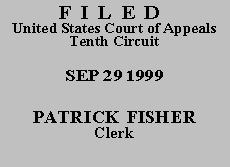

| RICHARD C. TOLBERT,
Plaintiff-Appellant, v. KPHN RADIO; MIKE SHANIN; STEPHEN G. MIRAKIAN, Defendants-Appellees. |
|
Plaintiff-appellant Richard C. Tolbert, proceeding pro se, filed this action in district court alleging that defendants-appellees KPHN, a radio station; Mike Shanin, a talk-show host on KPHN; and Stephen G. Mirakian, an attorney for KPHN, had engaged in employment discrimination in violation of Title VII of the Civil Rights Act of 1964. The district court appointed counsel to represent Tolbert, but then permitted counsel to withdraw due to a conflict of interest. Defendants filed motions for summary judgment, primarily on the ground that Tolbert, an occasional "guest co-host" on Shanin's show, was never a KPHN employee. When Tolbert failed to respond to defendants' motions, the district court ordered him to show cause why the motions should not be granted. Tolbert did not respond to the show cause order within the allotted time and the court entered summary judgment in favor of defendants. This appeal followed.
Summary judgment is appropriate if "there is no genuine issue as to any material fact and . . . the moving party is entitled to a judgment as a matter of law." Fed. R. Civ. P. 56(c). We review a grant of summary judgment de novo, applying the same standard applied by the district court. We construe the factual record and inferences reasonably made from it in the light most favorable to the nonmoving party. See McGarry v. Board of County Comm'rs, 175 F.3d 1193, 1198 (10th Cir. 1999).
"'District courts must take care to insure that pro se litigants are provided with proper notice regarding the complex procedural issues involved in summary judgment proceedings.'" Jaxon v. Circle K Corp., 773 F.2d 1138, 1140 (10th Cir. 1985) (quoting Garaux v. Pulley, 739 F.2d 437, 439 (9th Cir. 1984)). The grant of an unopposed motion for summary judgment against a pro se litigant may, in some circumstances, be an abuse of discretion. See id.
Pro se litigants are held to less stringent standards than those applicable to licensed attorneys. See Meade v. Grubbs, 841 F.2d 1512, 1526 (10th Cir. 1988). Nevertheless, they must "'follow the same rules of procedure that govern other litigants.'" Oklahoma Federated Gold & Numismatics, Inc. v. Blodgett, 24 F.3d 136, 139 (10th Cir. 1994) (quoting Green v. Dorrell, 969 F.2d 915, 917 (10th Cir. 1992)). Tolbert has admitted receipt of defendants' summary judgment motions. Additionally, he responded to KPHN's motion for dismissal, which called the court's attention to Tolbert's failure to respond to the show cause order. In that filing, Tolbert asserted that he had not received a copy of the order and speculated that it had been mailed to his former attorney. He did not, however, challenge the legal or factual premise of the summary judgment motions.
The failure to respond to defendants' motions has its consequences. Defendants have submitted evidence and argument demonstrating that Tolbert was not their employee. Tolbert has not provided any basis for disputing this conclusion. Accordingly, the record is bereft of any support for an element essential to Tolbert's case: that is, proof that defendants were his employers. See Lockard v. Pizza Hut, Inc., 162 F.3d 1062, 1069 (10th Cir. 1998) ("In order to establish a prima facie case under Title VII, [plaintiff] was required to prove, among other things, that [defendant] was her employer."). After reviewing the record on appeal, we determine that summary judgment was the appropriate disposition of this case.
Tolbert also contends that the district court erred in refusing to appoint replacement counsel. "We review the denial of appointment of counsel in a civil case for an abuse of discretion." Rucks v. Boergermann, 57 F.3d 978, 979 (10th Cir. 1995). The district court should consider the merits of the litigation, the factual issues raised, the litigant's ability to present his claims, and the complexity of the legal issues involved. Id. When the plaintiff is indigent, the district court has discretion to appoint counsel when, under the totality of circumstances, the denial of counsel would result in a fundamentally unfair proceeding. See McCarthy v. Weinberg, 753 F.2d 836, 839-40 (10th Cir. 1985).
After reviewing the district court's consideration of Tolbert's application, we conclude that the district court considered the required factors in exercising its discretion. Moreover, the denial of counsel did not result in a fundamentally unfair proceeding.
AFFIRMED. The mandate shall issue forthwith.
Entered for the Court
Circuit Judge
*. This order and judgment is not binding precedent, except under the doctrines of law of the case, res judicata, and collateral estoppel. The court generally disfavors the citation of orders and judgments; nevertheless, an order and judgment may be cited under the terms and conditions of 10th Cir. R. 36.3.